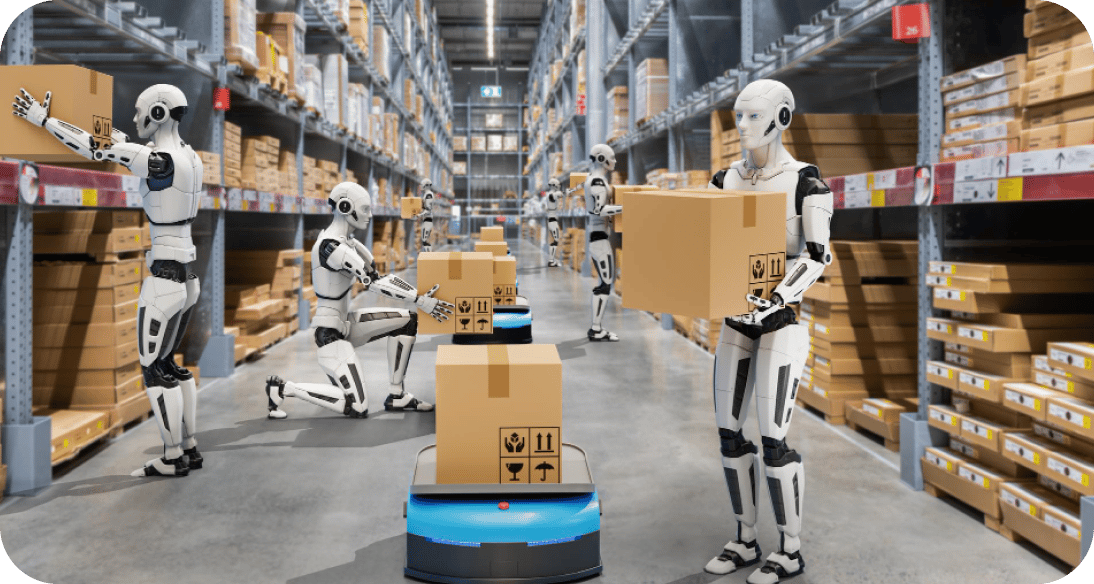- CrossDock by Hopstack
- Posts
- CrossDock, June 2023: CrossDock is evolving🚀
CrossDock, June 2023: CrossDock is evolving🚀
Key stories and trends that made the buzz in June 2023.
Welcome back to CrossDock.
CrossDock, our newsletter landing in your inbox every month for over a year is undergoing a major change. You’ll now see a new edition of the newsletter hit your inbox every fortnight as opposed to every month.
There’s a lot changing in this domain and a monthly recap doesn’t anymore capture the essence of the fast-paced industry we are in.
We are always open to feedback. Feel free to reply to this email and share what you loved about it, what we can change, and what else you’d like to see here!
In this newsletter:
Walmart’s massive new fulfillment center
FedEx and Floship partner up
Visualized: Impact of nearshoring in Mexico
Auctane acquires returns management software
Retailers scale back warehousing space
Warehouse robots are becoming more human-like
Amazon’s fulfillment fee surge
E-commerce Fulfillment📦
Walmart Enhances E-Commerce Operations with Indiana Fulfillment Center

Image credit: Walmart Corporate from Bentonville, USA, CC BY 2.0 https://creativecommons.org/licenses/by/2.0, via Wikimedia Commons
In a significant move to bolster its e-commerce operations, Walmart has launched a massive 2.2 million-square-foot fulfillment center in McCordsville, Indiana; marking it as the company's largest to date.
New High-Tech Facility Set to Boost Order Fulfillment and Create Tech Jobs
Equipped with state-of-the-art technology, the new facility is part of Walmart's strategic plan to expedite online order fulfillment. Incorporating robotics, machine learning, and human labor, it's set to generate new tech-focused jobs. Karisa Sprague, Senior VP of Fulfillment Network Operations at Walmart, highlighted the dual benefit of increased delivery speed and job creation.
The McCordsville center, employing around 1,000 workers, will leverage an automated five-step process aiming to ship orders within 30 minutes. This initiative aligns with Walmart's ambitious goal to reach 95% of U.S. consumers with next-day or two-day shipping.
Trending
Nearshoring is here to stay

Source: Prologis, ‘IMPACTS OF NEARSHORING ON DEMAND FOR MEXICAN LOGISTICS REAL ESTATE’
Amid rising rents for logistics real estate and a tight macroeconomic environment, many U.S. retailers seek logistics infrastructure in neighboring Mexico, thus dropping the country’s industrial vacancy rates tremendously.
This is a direct result of three critical aspects. First, the location and proximity are highly favorable. Monterrey, Mexico’s largest manufacturing hub sits only 3 hours away from the US border. Next is trade – Mexico has a free trade agreement with U.S. and Canada and is very well integrated with the countries’ trade and commerce. Lastly, the abundance of young and affordable labor is helping American companies bring down their operating costs significantly, making the country’s industrial hubs all the more enticing.
Read on to learn more about how the dynamics of offshoring in Mexico are playing out what the future holds.
FedEx Joins Forces with Floship to Boost Global E-commerce Logistics

FedEx Corp has announced a partnership with Floship, a global circular supply chain solutions provider. This collaboration, backed by the FedEx Innovation Lab (FIL), aims to redefine e-commerce logistics for brands worldwide; creating a digitized end-to-end fulfillment and return solution.
Bolstering E-commerce Operations
“This partnership with Floship opens up new avenues for our e-commerce customers.”, said a FedEx spokesperson. They will now have access to Floship’s expansive global network of warehouses, and their logistics platform's capabilities. This could revolutionize how they handle their e-commerce fulfillment operations. Similarly, Floship’s customers can now tap into FedEx's global networks and a myriad of transportation options to optimize their operations.
Customers in Asia-Pacific, the Middle East, Africa, Europe, and North America are set to benefit significantly. "Our cross-border e-commerce customers can look forward to enhanced fulfillment, seamless last-mile delivery, and hassle-free returns,” the FedEx spokesperson added.
M&A and Corporate Movement 📈
Auctane Expands E-Commerce Reach with Return Rabbit Acquisition

Multicarrier shipping solutions provider Auctane has made a significant strategic move with the acquisition of Return Rabbit, a leading returns management provider. This decision aims to bolster its e-commerce capabilities, especially in the realm of returns management.
Acquisition Enhances E-Commerce Offerings, Improves Returns Management
Return Rabbit, renowned for its integrated solution for returns management, is set to complement Auctane's multicarrier shipping portfolio. This merger is expected to offer intuitive, adaptable returns management to e-commerce merchants.
Auctane's VP of Corporate Development, Loran Gutt, highlighted Return Rabbit's role in filling market gaps and its leadership in revenue retention; with their advanced analytics also expected to mitigate return costs.
In a landscape where 44% of U.S. shoppers avoid retailers with difficult returns, Auctane aims to leverage Return Rabbit's capabilities to enhance customer understanding and improve sales preservation.
Number Spotlight
$14 Billion
The same-day delivery market size, currently growing at 12% CAGR, is expected to reach $14 billion by 2028.
Warehouse Real Estate🏭
Retailers Scale Back Warehouse Space as Pandemic Disruptions Recede

As COVID-19 pandemic disruptions recede and consumer spending habits shift toward services, retailers are streamlining their logistics networks and shedding warehouse space.
Pandemic-Prompted Logistics Realignment
Companies like Big Lots and Walmart have begun closing warehouses and laying off distribution workers as part of a larger realignment of logistics operations. Amid declining sales, Big Lots closed four distribution centers last month, initially opened to accommodate pandemic-induced growth.
Changing Economy Affects Industrial Real Estate, Employment
As demand slows and the need for inventory decreases, retailers are cutting back on distribution centers. Industrial real estate's vacancy rate, which had plummeted to a multiyear low of 2.9% in Q2 2022 due to pandemic-driven e-commerce demands, has started rising again. This contraction is also impacting warehouse employment, with payrolls in the sector falling by over 41,000 jobs in the past year.
Companies, including retail giant Walmart, have adjusted staffing levels in fulfillment centers across the country, citing a need to prepare for future customer needs. Walmart's comparable sales grew 7.4% in the quarter ending April 28, but CFO John David Rainey noted a slowdown in sales as the quarter progressed.
As Quoted by
“You’re starting to see demand slowing and they’re realizing, ‘Maybe we don’t need as much inventory, and if we don’t need as much inventory, we don’t need as many [distribution centers]”
Rob Handfield
Supply Chain Management Prof. at North Carolina State University
Warehouse Technology🦾
Robots Bring a Human Touch to Warehouses

As warehouse operators grapple with labor shortfalls and the limitations of current automation, companies such as Agility Robotics, Figure AI, and Boston Dynamics are developing humanoid robots for logistics operations. These robots are designed to navigate warehouses like humans, reach high shelves, and handle heavy items, reducing the need for an extensive redesign of warehouse environments.
Humanoid Robots Step Up Automation Game
Traditional warehouse automation devices are intended to aid human employees by performing heavy or repetitive tasks.
However, humanoid robots such as Agility Robotics' Digit, funded by Amazon, offer a novel solution. With the ability to operate within existing infrastructure and perform tasks difficult to hire for, they promise to redefine warehouse automation.
Balancing Efficiency and Cost
Despite their potential, humanoid robots also present challenges - high upfront costs, operation duration limitations, and the disruption of warehouse operations being some.
As robots continue to evolve, the central consideration remains their ability to execute tasks efficiently, safely, and at the right price.
E-commerce Selling🛒
Amazon Raises Multi-Channel Fulfillment Fees Amid Rising Operational Costs

Amazon has announced an increase in the costs of its multi-channel fulfillment (MCF) service for European sellers due to rising operational costs and inflation.
Impacts and Reactions to the Change
Primarily affecting the parcel size and oversize categories, the new fees take effect next month. This move has left retailers disappointed, with many stating they would have to hike their own prices. Amazon claims the fee increase is necessary to "reflect rising operational costs brought about by inflationary pressures."
Furthermore, Fulfilment by Amazon (FBA) prices have also seen a recent average increase of 6.2 percent. This sensitive issue arises amidst a recent investigation into Amazon allegedly favoring sellers using their in-house fulfillment service.
Thanks for reading. We’ll see you in the next edition of CrossDock! We also publish all our editions on the website here.